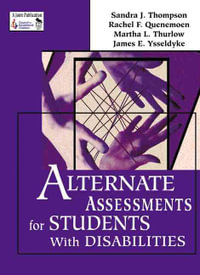
Weaving Science Inquiry and Continuous Assessment
Using Formative Assessment to Improve Learning
By: Maura O'Brien Carlson, Gregg E. Humphrey, Karen S. Reinhardt
Paperback | 8 February 2012
At a Glance
Paperback
$64.99
Aims to ship in 5 to 10 business days
When will this arrive by?
Enter delivery postcode to estimate
"The authors provide a rationale and practical tools for weaving continuous assessment and instruction in science into the fabric of learning. Teachers who use the methods in the book will know what and how students are learning every day and gain insights into how to best facilitate learning in their classrooms."
â"From the Foreword by Susan Mundry
Experience the delight and professional growth that comes from engaging deeply with your students!
By combining science inquiry and continuous assessment, you will not only catalyze meaningful changes in your studentsâ² thinking and learning but also reflect on and enhance your own approach to teaching. Inquiry science is a standards-based teaching method whereby students ask questions and find answers for themselves using scientific methods under the guidance of a teacher. Continuous assessment is a purposeful approach to listening and observing students and using that information to understand a studentâ²s thinking and skills. Formulating strategies and plans to support each studentâ²s intellectual growth is the next step in this circular process.
Weaving Science Inquiry & Continuous Assessment explores the nature of continuous assessment in the context of science inquiry, and contains specific tools and techniques, along with stories and strategies in teachersâ² own words. Chapters cover the following subjects that reflect the latest information and most current teaching environment:
- The essence of continuous assessment
- The context for continuous assessment
- Techniques and tools for facilitating inquiry and collecting student data
- Analyzing and using continuous assessment data
- Challenges, realities, and advice
- Continuous assessment and professional growth
By engaging in this process of inquiry and continuous assessment, both students and teachers will benefit from this fresh approach to learning, thinking, and assessment.
Industry Reviews
ISBN: 9780761945901
ISBN-10: 0761945903
Series: One-Off Ser.
Published: 8th February 2012
Format: Paperback
Language: English
Number of Pages: 152
Audience: Professional and Scholarly
Publisher: CORWIN PRESS, INC.
Country of Publication: GB
Dimensions (cm): 25.4 x 17.78 x 0.81
Weight (kg): 0.33
Shipping
| Standard Shipping | Express Shipping | |
|---|---|---|
| Metro postcodes: | $9.99 | $14.95 |
| Regional postcodes: | $9.99 | $14.95 |
| Rural postcodes: | $9.99 | $14.95 |
How to return your order
At Booktopia, we offer hassle-free returns in accordance with our returns policy. If you wish to return an item, please get in touch with Booktopia Customer Care.
Additional postage charges may be applicable.
Defective items
If there is a problem with any of the items received for your order then the Booktopia Customer Care team is ready to assist you.
For more info please visit our Help Centre.
You Can Find This Book In
This product is categorised by
- Non-FictionEducationTeaching of a Specific Subject
- Non-FictionEducationOrganisation & Management of EducationExaminations & Assessment
- Non-FictionEducationOrganisation & Management of EducationTeaching StaffTeacher Assessment
- Non-FictionScienceScience in General
- Text BooksHigher Education & Vocational TextbooksEducation Higher Education Textbooks
- Non-FictionEducationEducational Psychology























